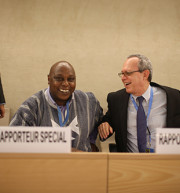
GENEVA – United Nations Special Rapporteur Maina Kiai will be in Geneva this week to present his latest reports to the UN Human Rights Council and to participate in other events.Kiai, will present two reports covering his country visits to Oman and Kazakhstan and a third focusing on assembly and association rights of the context of natural resource exploitation. A fourth report contains his observations on the mandate’s official communications with UN Member States and replies between March 1, 2014, and February 28, 2015.Kiai, who is the UN Special Rapporteur on the rights to freedom of peaceful assembly and of association, is scheduled to present to the 29th Session of the Council at the Palais des Nations, Room XX, during the June 17 session starting at 11:30 a.m. His presentation may run into June 18, depending on the length of other agenda items. The session will be broadcast live on http://webtv.un.org/.Thematic report: Natural resource exploitation Kiai’s fourth thematic report to the Council examines the role that the rights to freedom of peaceful assembly and of association play in opening space for genuine participation across the spectrum of natural resource exploitation activities. The report defines natural resource exploitation widely to include a broad range of materials such as land,... Continue reading →

The Special Rapporteur’s factsheet summarizing the rights to freedom of peaceful assembly and of association in the context of natural resource exploitation, presented in an easy-to use “yes/no” format, with hyperlinks to source materials. This factsheet draws heavily from the Special Rapporteur’s 2015 report to the UN Human Rights Council and features guidance on: • The obligation of States and corporations to uphold assembly and association rights in the context of natural resource exploitation • States' responsibilities regarding private security firms and violations of human rights by corporations • The issue of blanket bans on peaceful assemblies surrounding natural resource exploitation operations • The rights of unregistered associations to participate in consultation processes • And more The factsheet also summarizes the report’s recommendations, highlights key statistics in a “by the numbers” feature, and looks at the current international legal and regulatory framework for the sector. For the Special Rapporteur’s full factsheet series, please see:... Continue reading →

The global economy relies heavily on the availability and exploitation of natural resources. With that demand has come a plethora of concerns relating to the sustainability of economic growth and its impact on the climate, the environment and, more generally, on human rights. Despite the high stakes, citizen engagement in the natural resources sector is notoriously difficult. Secrecy cloaks decision-making processes and outcomes; there is a lack of mechanisms through which interested parties may express their concerns; discussions are often highly technical; and, above all, the financial stakes are often massive. This opaque and lucrative environment presents ideal conditions for corruption to thrive, a challenge with which many resource-rich countries have to contend. In this report, Special Rapporteur Maina Kiai examines the role that the rights to freedom of peaceful assembly and of association play in opening space for genuine and effective participation across the spectrum of natural resource exploitation activities. He also examines how these rights help foster increased transparency and accountability, facilitate constructive dialogue, and ultimately form the basis for people’s ability to secure other substantive rights. “The significance of civil society as a stakeholder in the context... Continue reading →

The Special Rapporteur’s factsheet summarizing his official visit to Oman in September 2014 highlights issues surrounding the rights to freedom of peaceful assembly and of association and is presented in an easy-to use “yes/no” format, with hyperlinks to source materials. This factsheet draws heavily from the Special Rapporteur’s report on the Oman visit, which was presented to the Human Rights Council in June 2015. It provides details and analysis of: • The authorization process for peaceful assemblies in Oman • The registration of associations, and the Government's role in regulating the civil society sector • Oman's ban on political parties and political associations • The Special Rapporteur's findings and recommendations • The case of human rights defender Said Jadad, who was arrested following the Special Rapporteur's visit • And more The factsheet also gives background information on Oman, including vital statistics and its "scorecard" on ratifying key UN human rights treaties. For the Special Rapporteur’s full factsheet series, please see:... Continue reading →

The Special Rapporteur's factsheet summarizing the legal issues and challenges surrounding civil society's ability to access resource, presented in an easy-to use "yes/no" format, with hyperlinks to source materials. This factsheet draws heavily from the Special Rapporteur's 2013 report to the UN Human Rights Council and features guidance on: • The recognition of the importance of the ability to access resources in international law • The effect of registration on an association's ability to access resources • Permissible and impermissible restrictions on the ability to access resources - with an analysis of some common justifications for restrictions • The importance of the ability to access resources • And more The factsheet also summarizes the report's recommendations and provides links to selected international legal instruments dealing with the subject of civil society's ability to access resources. For the Special Rapporteur's full factsheet series, please see:... Continue reading →

Issue No. 11 of the Assembly and Association Briefing, the newsletter of Maina Kiai, UN Special Rapporteur on the rights to freedom of peaceful assembly and of association. In this issue: • Special Rapporteur in Geneva to launch ‘landmark’ freedom of association guidelines on sidelines of HRC session • ‘Two legal reform projects undermine the rights of assembly and expression in Spain’ – UN experts • Mass death sentences in Egypt a profound disgrace, UN human rights experts say • UN rights experts urge release of Bahrain opposition politician • Australia: Special Rapporteur welcomes moves to repeal restrictive laws on protest • Steering the final two years of Kiai’s UNSR mandate • Freedom of association and assembly: By the numbers • Special rapporteur news in brief: February-March 2015 • A call to submit cases in the UNSR’s litigation project • World briefing: Freedom of assembly and association in the news For a link to the newsletter, click on the image at right or click here (1.4MB file) or here (5MB full resolution file). To subscribe to our newsletter, please drop us a line at info@freeassembly.net with the subject line “subscribe to newsletter.” For other recent newsletters, see the links below: The Assembly and Association Briefing, Vol. 1,... Continue reading →

GENEVA – United Nations Special Rapporteur Maina Kiai will be in Geneva this week to participate in several events on the margins of the 28th Session of the UN Human Rights Council, including the launch of landmark joint guidelines on the right to freedom of association. The guidelines – which were developed by the Organization for Security and Co-operation in Europe’s Office for Democratic Institutions and Human Rights (OSCE-ODIHR) and the Venice Commission – are the first of their kind in the field on association rights. They were adopted and released last December, and are being officially launched on March 5. The guidelines are currently available via the OSCE-ODIHR website via this link: http://www.osce.org/odihr/132371 The guidelines offer advice and expertise on how to legislate on freedom of association-related matters in a manner consistent with international human rights standards and OSCE commitments. They also reflect evolving good state practices, and are intended to enhance awareness of the right to freedom of association in general. The Special Rapporteur and his team participated in the development of the guidelines, most notably at a consultation in Warsaw, Poland, last year that brought together experts from around the world. “International treaties merely set out broad... Continue reading →

Issue No. 10 of the Assembly and Association Briefing, the newsletter of Maina Kiai, UN Special Rapporteur on the rights to freedom of peaceful assembly and of association. In this issue: • Full coverage of the Special Rapporteur's visit to Kazakhstan • Oman: UN experts call for the immediate release of activist Said Jadad, as reprisals continue unchecked • Lao: Two years later, Sombath Somphone still missing • Bahrain: Kiai joins call to drop charges against women activists for government criticism • UNSR releases first-ever annual report recapping 2014 • Freedom of association and assembly: By the numbers • Special rapporteur news in brief: December 2014 - January 2015 • World briefing: Freedom of assembly and association in the news For a link to the newsletter, click on the image at right or click here (1.5MB file) or here (6.5MB full resolution file). To subscribe to our newsletter, please drop us a line at info@freeassembly.net with the subject line “subscribe to newsletter.” For other recent newsletters, see the links below: The Assembly and Association Briefing, Vol. 1, No. 7 (September 2014) The Assembly and Association Briefing, Vol. 1, No. 8 (October-November 2014) The Assembly and Association Briefing, Vol. 1, No. 9 (December 2014) All previous... Continue reading →

The need for natural resources such as land, water, timber, minerals, oil and gas is continually increasing worldwide. That increasing demand has naturally led to more competition – and often more social conflict. In many cases, decisions concerning the exploitation of natural resources are made in an opaque manner. Governments cut backroom deals with corporations without the input of those affected. Official corruption often looms large. The ostensible owners of the property being exploited may not benefit at all from the project. The systematic exclusion of key stakeholders in the context of natural resource exploitation is counterproductive and may, in some circumstances, amount to a deprivation of the rights to freedom of peaceful assembly and of association. More to the point, this exclusion can lead to anger, divisions within society and long-term threats to the project in question. For his upcoming report to the Human Rights Council in June 2015, UN Special Rapporteur Maina Kiai plans to focus on the exercise of the rights to freedom of peaceful assembly and of association in the context of the exploitation of natural resources. The importance of assembly and association rights in the context of the exploitation of natural resources cannot be understated. Indeed in many countries, social... Continue reading →

GENEVA – Special Rapporteur Maina Kiai today urged UN member states to protect the assembly and association rights of all people within their borders – including those who are “seen as being different” and may be marginalized as a result. Kiai’s remarks were delivered to the Human Rights Council on June 10-11 in Geneva, where he presented three reports – a thematic report on the assembly and association rights of groups “most at risk,” a country report on his official mission to Rwanda, and third on communications transmitted to UN Member States. The Special Rapporteur’s most recent thematic report documents the challenges faced by marginalized groups in exercising – or seeking to exercise – their rights to freedoms of peaceful assembly and of association. These groups, deemed “most at risk,” include persons with disabilities; youth; women; lesbian, gay, bisexual, transgender and intersex (LGBTI) people; members of minority groups; indigenous peoples; internally displaced persons; and non-nationals, including refugees, asylum seekers and migrant workers. “It matters not whether we approve or support the activities of these marginalized groups at risk,” Kiai told the Council. “The test of international law is that as long as their activities are non-violent,... Continue reading →